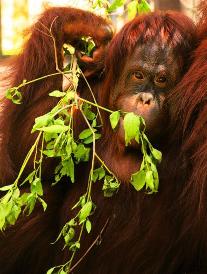Did You Know...
That the Borneo rainforest is 130 million years old, making it the oldest rainforest in the world?
There are about 15,000 species of flowering plants with 3,000 species of trees (267 species are dipterocarps), 221 species of terrestrial mammals and 420 species of resident birds in Borneo.
Welcome To
Deforestation Education!
At this website you can learn about Palm Oil and Deforestation, See how it is jeopardizing the lives of many different kinds of plants and animals, See what you can do to help and so much more!
Please share this with
Friends and Family to get the word out!
Awareness is a KEY essential to
Help Save The Rainforest!
Help Save The Rainforest!
Be Sure To Visit Our Sister-Site: World Orangutan Events


7 Ways to Detect & Avoid Palm Oil
Please do not boycott companies that are trying to change in a Rainforest-Friendly/Eco-Friendly Way. (Avoid Palm Oil that is not produced sustainability!)
The list below consists of a number of different ways in which you can detect and avoid palm oil when shopping:
- The most common name palm oil is hidden under is 'vegetable oil'. Almost all Asian products or products made in Asia that have 'vegetable oil' written on the label means that it is palm oil.
- Most pre-packaged snack foods made by well known, large corporate-giants (Nestle, Unilever etc) contain palm oil.
- If a product's saturated fat content is over 40% of it's total fat content, it will almost always have palm oil in it.
- Ingredients with the word 'palm' in them are palm oil or are derived from the oil palm fruit (as shown in the ingredient list below).
- Nearly all home-brand/no-name pasties and confectionery will contain palm oil (Coles/Safeway donuts, muffins, cakes, chocolate, confectionery etc).
- If you are not sure whether a product contains palm oil, either type the product name into google along with 'palm oil'and see the search results, or call the company and ask if they use palm oil.
- To avoid palm oil, look out for products that contain alternative vegetable oils, such as 100% sunflower oil, corn oil or canola oil. However, please note that Soybean oil is often associated with the destruction of rainforest in Brazil.
IMPORTANT:
Just because a product says it is "Organic" or "Cruelty-Free" does not mean it doesn't contain palm oil. In fact, most natural/organic products do contain palm oil - because palm oil is a very much a natural ingredient. It's the way it is produced that is far from natural, which is something many companies fail to realize.
The Other Names Of Palm Oil
- PKO – Palm Kernel Oil
- PKO fractionations: Palm Kernel Stearin (PKs); Palm Kernel Olein (PKOo)
- PHPKO – Partially hydrogenated Palm Oil

- FP(K)O – Fractionated Palm OilKO – Organic Palm Kernel Oil
- Palmitate – Vitamin A or Asorbyl Palmitate (NOTE: Vitamin A Palmitate is a very common ingredient in breakfast cereals and we have confirmed 100% of the samples we’ve investigated to be derived from palm oil)
- Palmate
- Sodium Laureth Sulphate (Can also be from coconut)
- Sodium Lauryl Sulphates (can also be from ricinus oil)
- Sodium dodecyl Sulphate (SDS or NaDS)
- Elaeis Guineensis
- Glyceryl Stearate
- Stearic Acid
- Chemicals which contain palm oil
- Steareth -2
- Steareth -20
- Sodium Lauryl Sulphate
- Sodium lauryl sulfoacetate (coconut and/or palm)
- Hydrated palm glycerides
- Sodium isostearoyl lactylaye (derived from vegetable stearic acid)
- Cetyl palmitate and octyl palmitate (names with palmitate at the end are usually derived from palm oil, but as in the case of Vitamin A Palmitate, very rarely a company will use a different vegetable oil)
 Vegetable Oil
Vegetable Oil- Vegetable Fat
- Sodium Dodecyl Sulphate (SDS or NaDS)
- Palm Fruit Oil
- Palmolein
- Palmitic Acid
- Palm Stearine
- Palmitoyl oxostearamide
- Palmitoyl tetrapeptide-3
- Sodium Kernelate
- Sodium Palm Kernelate
- Octyl Palmitate
- Cetyl Alcohol
- Palmityl Alchohol
Copyright by Deforestation Education 2014-ALL RIGHTS RESERVED



